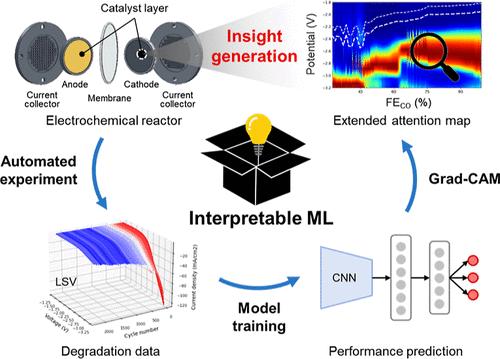Discovering the Origin of Catalyst Performance and Degradation of Electrochemical CO2 Reduction through Interpretable Machine Learning
IF 13.1
1区 化学
Q1 CHEMISTRY, PHYSICAL
引用次数: 0
Abstract
Catalyst degradation is a significant challenge for the commercialization of the electrochemical reduction of CO2, as it decreases activity and selectivity. However, the high experimental cost of catalyst characterization hinders the generation of sufficient and valuable information regarding catalyst degradation. Recently, machine learning (ML) models have exhibited high potential to replace costly processes, but their low interpretability makes their application challenging. Herein, we introduce an interpretable ML framework that accurately projects the catalyst status using simple linear sweep voltammetry (LSV) within subseconds while providing insights into the origin of catalyst degradation. A convolutional neural network trained on experimentally collected 5196 LSV results achieved superior performance in total current and Faradaic efficiency predictions. The ML framework demonstrates an impressive accuracy of mean absolute error below 0.5% in predicting the Faradaic efficiency of various products, irrespective of the operating conditions and catalyst types. The prediction mechanism learnt by the model was interpreted via explainable artificial intelligence (XAI), and critical degradation factors were identified. We performed catalyst surface analyses at milestone points to verify the XAI interpretation and demonstrate the reliability of the proposed framework. This approach can potentially be applied to a wide range of electrochemistry involving catalytic process, battery degradation, and chemical process monitoring, suggesting that it offers a viable means of rapidly and reliably monitoring performance.

通过可解释的机器学习发现催化剂性能的起源和电化学CO2还原的退化
催化剂降解是二氧化碳电化学还原商业化的一个重大挑战,因为它降低了活性和选择性。然而,催化剂表征的高实验成本阻碍了关于催化剂降解的充分和有价值的信息的产生。最近,机器学习(ML)模型已经显示出取代昂贵过程的巨大潜力,但其低可解释性使其应用具有挑战性。在此,我们引入了一个可解释的ML框架,该框架使用简单的线性扫描伏安法(LSV)在亚秒内准确地预测催化剂状态,同时提供了对催化剂降解起源的见解。卷积神经网络在5196个LSV实验数据上进行了训练,在总电流和法拉第效率预测方面取得了优异的成绩。无论操作条件和催化剂类型如何,ML框架在预测各种产品的法拉第效率方面显示出令人印象深刻的平均绝对误差低于0.5%的准确性。通过可解释人工智能(XAI)对模型学习到的预测机制进行了解释,并确定了关键退化因素。我们在里程碑点进行了催化剂表面分析,以验证XAI解释并证明所提出框架的可靠性。这种方法可以潜在地应用于广泛的电化学过程,包括催化过程、电池降解和化学过程监测,这表明它提供了一种快速可靠地监测性能的可行方法。
本文章由计算机程序翻译,如有差异,请以英文原文为准。
求助全文
约1分钟内获得全文
求助全文
来源期刊

ACS Catalysis
CHEMISTRY, PHYSICAL-
CiteScore
20.80
自引率
6.20%
发文量
1253
审稿时长
1.5 months
期刊介绍:
ACS Catalysis is an esteemed journal that publishes original research in the fields of heterogeneous catalysis, molecular catalysis, and biocatalysis. It offers broad coverage across diverse areas such as life sciences, organometallics and synthesis, photochemistry and electrochemistry, drug discovery and synthesis, materials science, environmental protection, polymer discovery and synthesis, and energy and fuels.
The scope of the journal is to showcase innovative work in various aspects of catalysis. This includes new reactions and novel synthetic approaches utilizing known catalysts, the discovery or modification of new catalysts, elucidation of catalytic mechanisms through cutting-edge investigations, practical enhancements of existing processes, as well as conceptual advances in the field. Contributions to ACS Catalysis can encompass both experimental and theoretical research focused on catalytic molecules, macromolecules, and materials that exhibit catalytic turnover.
 求助内容:
求助内容: 应助结果提醒方式:
应助结果提醒方式:


